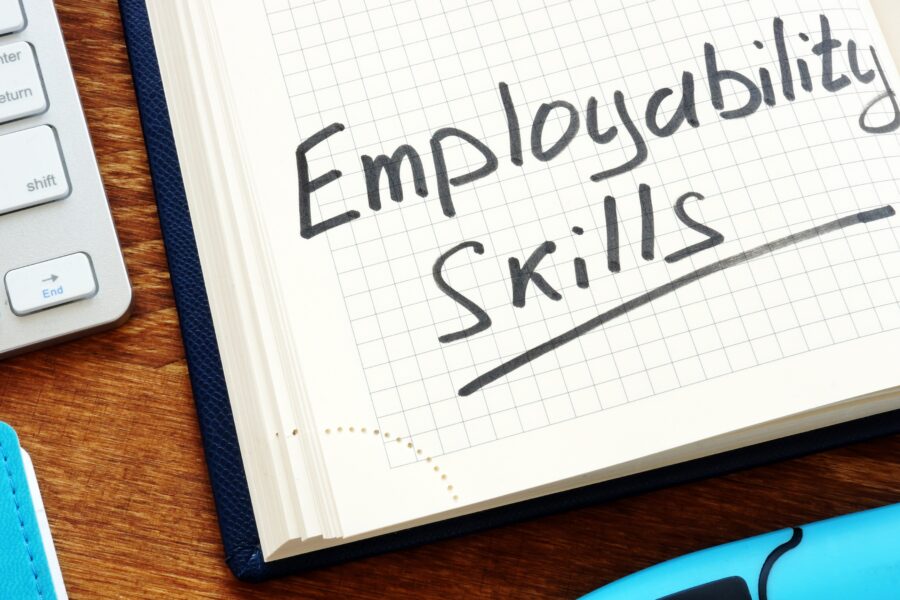I find people are their best when they’re working towards a goal – I am at least.
And when you work towards a goal, there’s a kind of feeling of permanence to that goal, as if that’s the only thing you’ll ever do in life.
And sometimes when you question your abilities, skillsets, personality, or opportunity in relation to that goal, the feeling of permanence starts to chip a little.
And if you allow those feelings to fester, you’ll be left questioning where exactly you are in life, whether or not you’ll succeed, and whether getting a job is even possible.
I’ve experienced these feelings more times than I can count. And though I’m a little more stable now, over the next 4 weeks I hope to completely and honestly confront the anxiety around putting yourself out there, truly realizing what your weaknesses are, and working towards a realistic and achievable goal using that information.
With the help of Acadiate of course.
I came to UTM with a plan to study Professional Writing & Communication.
It wasn’t my first choice.
After falling into depression in 12th grade and failing my physics class, all prospects of becoming a mechanical engineer were gone.
“You’ve always been creative, and you like to write. There’s good money in writing. I didn’t go into a creative field, but maybe you should,” my sister told me on warm summer night inside a Tim’s.
It ended up being a wonderful decision, but not for those reasons.
After working for the Medium for 2 years and experiencing the pressures of WRI portfolio courses, I decided writing was too tedious for me.
I – I decided – was a dynamic creative.
So I went into graphic design. I worked with ICCIT Council, ICUBE, and ran through a few personal projects before being picked up by the Career Centre for marketing.
In between I explored web design, cyber security, and about a million other career choices which were either uninteresting, tedious, or had high barriers to entry.
By this point, I also found I liked competition – I had a kind of drive to do whatever it took to reach a goal. So I switched my degree to Digital Enterprise Management at the end of my 2nd year. I kept professional writing as a minor.
I was never much for job searching. After sitting down and thinking about it, all the jobs I’ve had up to this point came from a slim moment in time.
What I mean by that is: somebody said “hey, Anton, look, a job” and I immediately locked onto it because it was there and it kind of felt like what I was doing.
I never bothered to ask myself “is what I’m doing 100% what I want?”
Until this year.
Very recently I noticed that our methods to marketing at the UTM Career Centre were a shotgun approach. My boss would come to me with a new event and we would think of ways to market it (usually a combination of physical flyers, social media posts, and in-person marketing). There was no reasoning to it.
“Hey, Doug, you know how we swipe people in with their T-Cards or how they have to register?” I asked my boss one day, “do we have that information?”
We did.
I couldn’t believe it.
We had years of data on who attended which event, whether they registered or just attended, when the events ran, and even demographic information separated by year and degree.
I had him export the data into batches based on events, workshops, and fairs.
I jumped in headfirst, cleaning the sheets and gaining a sense of the information it could offer me.
I had absolutely no idea what I was doing but I knew I was happy.
As I thought about it more and more, I realized that it wasn’t just the numbers that fascinated me. The concept of data – personal data from your phone, your body, your actions – is the closest thing to objective truth. I love data because when you gather enough of it, and when you ask the right questions, it can give you powerful truths about the world that no philosophical or experimental approach can. It’s like running millions of unbiased experiments at the same time.
I hope to one day use personal data to give people the resources to affect their mood.
When Zane told me he wanted me to spend 4 weeks with him and David focusing myself, I was immediately excited – because I enjoy helping others and I love the Acadiate platform.
But when I sat down and read the chapters on the website, I became a little bit anxious.
The second chapter listed 39 aspects of employability and invited me to put them in a SWOT analysis.
Remember when I said I was a “little bit” anxious? That’s an understatement.
I spent the Sunday worrying about what “self-malleability” theory meant until my girlfriend asked me if I bothered to look into any of the terms that were confusing me – I didn’t.
But even after she told me that, I didn’t want to spend time psychoanalyzing myself.
I’d rather do projects and excel at skills.
They also asked me to find 2 job postings that I found interesting and would actually consider applying for. I found 2 jobs as a Data Analyst – one for CIBC and the other Tangerine.
This made me realize 2 things:
- I have no idea what industry tools look like.
For the most part, I’ve been using Excel to analyze my data, but data analysts in the industry use BI, Tableau, SQL, and languages like Python and R on top of other Microsoft infrastructure like SSAS.
- There are actually a lot of jobs.
If you’re thinking this is a good point, it’s not. There are a lot of jobs that sound like data analysis but aren’t. Or they’re a senior position, or a management position, or they don’t give enough information about the job, or any other number of things.
It takes time – which is a resource graduates don’t particularly have a lot of – to sort through all the noise and find a job that they 100% want to pursue, at the appropriate level, at a company they can identify with on a personally.
Last week I organized a job shadow to 500px – a social media platform for photographers where a friend of mine (a recent graduate) works.
Up until this point, I was sure that I wanted to go to IBM. They’re a monolith of a company with nearly unlimited resources that I can use to achieve my vision.
But what I saw at a startup surprised me.
“Yeah, I started here 9 months ago doing marketing and now I’m doing growth – it’s really weird. You just pick up and learn stuff,” Raf told me in a small meeting room named after the colour of the chairs (blue).
The office was a big circle built into a brick infrastructure. There was a room with a hammock and board games, free cereal and beer, and 2 dogs which lived in the office and ran around asking for attention.
Raf introduced me to Summer – a data analyst he works with.
I was thankful to finally find someone who could help me ask the right questions, but I had no idea how friendly and personable she would be.
It didn’t feel like I was talking to someone corporate – it felt like talking to a friend.
We have a google hangouts scheduled in the next few weeks.
I used to think of IBM as a gateway to learning, but I may find the same gateway with less bureaucracy at startups.
So how do I feel at this point?
I’m not exactly sure.
I’m confident because I know I can get excited about current technologies and I know people in those fields that I can work with.
I lose confidence and self-esteem when I make assumptions about my future financial situation, how I’ll succeed, or my own abilities.
Lastly, I feel like the biggest problem for students is finding “the best thing”. Our parents always iterate to be the best at something, make the most money, get the highest grades – and we’re quickly finding that our notions of what “best” is, isn’t always right or at all what we want.
Is making the most money for a company that tests on animals really being the best?
Is being the best writer or marketer or programmer worth the social sacrifice?
Is getting the best grade worth the knowledge you actually receive?
I don’t know.
These conflicts, along with the overwhelming amount of opportunity we’re given makes us anxious and afraid and prevents us from being curious and excited about one thing that makes us happy – only one thing.
That one thing for me right now is data, and I can’t wait to see how good I can be at it.
At least for now.




